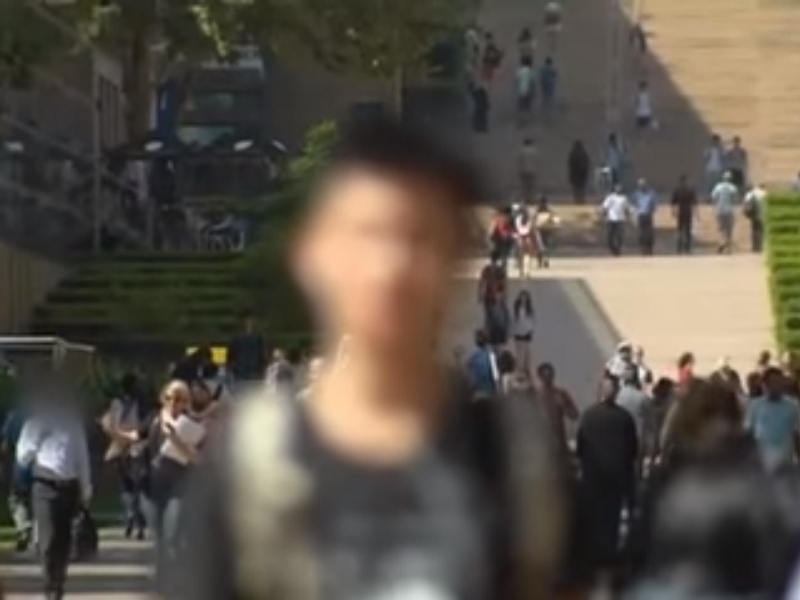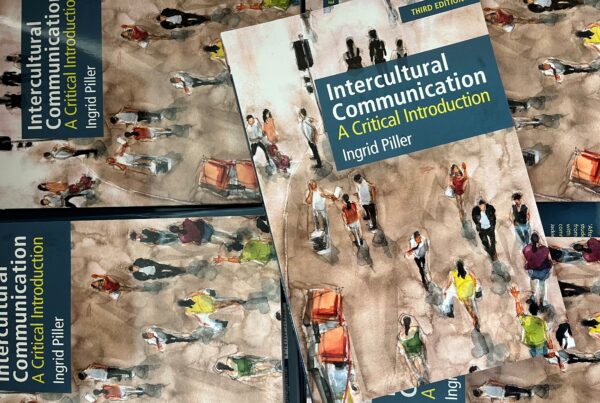
Do we see international students as opportunity or threat? (Screenshot from ‘Degrees of Deception’)
With recent news on the number of international students in Australia reaching a new high and the 19.4 billion-dollar revenue student fees generate for the Australian economy, these students’ experience in Australia has become an important issue. Two different points of view can be distinguished: while one perspective sees international students as enriching Australian society through their diversity, another one frames them as problematic Other. Their imputed low English language proficiency is often seen as the root cause of the latter. While there have been attempts at representing international students in the media through the first perspective, I argue below that these attempts can only work if language proficiency is addressed in a constructive way, that goes beyond the monolingual mindset.
In their study, Paltridge, Mayson and Schappler (2014) analysed news articles covering international students from The Australian newspaper published between 2009 and 2011. The researchers found that media discourses result in the dual phenomenon of ‘welcome and exclusion […] by constructing them as “economic units” wanted and welcomed by the nation, as well as unwanted “exploiters of the immigration system” and excluded “victims” of violence and racism’ (p. 108). These media articles obviously frame students as a problematic out-group.
“Degrees of Deception”
The issue of English language proficiency also featured strongly in an episode of an ABC program, 4 Corners, entitled ‘Degrees of deception’ in April 2015, which focused on declining academic standards. According to the introduction, declining academic standards were evident in the rising ‘tide of academic misconduct’ and the pressure for academics to pass weak students (so-called ‘soft marking’). According to the report, these are due to the combined effect of a decline in government funding for universities and the increasing reliance on international student fees. International students, so the show’s claim, are ‘desperate for a degree from an Australian university and the possibility of a job and permanent residency’. Consequently, entry requirements have supposedly been lowered and cheating and plagiarism have become widespread. The episode claims that academics are appalled but are afraid to speak up for fear of their jobs.
After airing the episode, the 4 Corners team stressed on their Facebook and Twitter accounts that the episode was not about ‘international students being worse than other students’. However, a corpus linguistic analysis of the episode transcript reveals that the the most frequent content words on the show – ‘student’ and ‘students’ – usually refer to ‘international students’. This group was referred to 88% of the time when using the word ‘student’; by contrast, local students are referenced in only 7% of occurrences. Moreover, the word ‘student’ most commonly collocates with or appears close to words with negative connotations, like ‘exploited’, ‘weak/weaker’, ‘targeting’, or ‘struggling’.
Secondly, the vast majority of social media comments on Facebook related to the show discussed international students as inadequate on the basis of some form of low English language competence.
Using Van Leeuwen’s (1996) social actor framework, I have also found that international students as social actors are often abstracted behind concepts such as ‘fall in standards’, ‘poor English’, ‘pressure on the system’, ‘plagiarism’ and ‘income’. The analysis shows that the 4 Corners episode did in fact imply that international students are worse than others; their low English language proficiency is constructed as the root cause of this problem.
What is more, the fact that the findings of Paltridge et al. (2014) focusing on a conservative newspaper, The Australian, are echoed in a data set coming from a more liberal media outlet and its supposedly more liberal audience, suggests that this stereotyping of international students is widespread in Australia.
The Othering of international students on the basis of language proficiency needs to be addressed. One way to do so is by reflectively engaging with linguistic diversity through addressing the monolingual mindset prevalent in Australia, which makes it difficult to move beyond defining international students as the perpetual Other in the ‘white Anglo space’ of the Australian university.
Related content
- Grace Chu-Lin Chang, Language learning challenges of international students
- Grace Chu-Lin Chang, What is “Competent English”?
- Grace Chu-Lin Chang, Losing voice in academic writing
- Ingrid Piller, Exclusion on campus
- Ingrid Piller, Sink or swim for international students
- Kimie Takahashi, Disenchanted in Bangkok
 Language Lovers Blogging Competition 2017
Language Lovers Blogging Competition 2017
If you liked this post, don’t forget to vote for Language on the Move in the 2017 Language Lovers blogging competition over at the ba.bla voting page! Voting closes on June 06.
Paltridge, T., Mayson, S., & Schapper, J. (2014). Welcome and exclusion: an analysis of The Australian newspaper’s coverage of international students Higher Education, 68 (1), 103-116 DOI: 10.1007/s10734-013-9689-6
Van Leeuwen, T. (1996). The representation of social actors. In C. R. Caldas-Coulthard & M. Couthard (Eds.), Texts and practices: readings in critical discourse analysis. London, New York: Routledge.






 This work is licensed under a
This work is licensed under a
Hello, Dr. Agnes! I like how you pointed out your thoughts and shed light on this issue. It also made me wonder about the positive and negative sides of the skyrocketing number of international students in one country. In my perspective, there is nothing wrong with wanting to learn more and getting out of your native land to find opportunities. If international students are only liked just because of the revenues that they contribute to the host country, I think it is unfair on their part to be treated like that. One should not expect that all of the international students are fluent in English because it is not their mother tongue, but I also understand that they are in Australia; fluency is a must when you want to learn there. However, this matter should be addressed properly and constructively. They should not shame them for the things that can be learned. For plagiarism, give the consequences of their actions because plagiarizing is unacceptable. I would also like to point out that one’s English fluency alone should not be a measurement for one’s intelligence and skills just like what academic researchers pointed out in their studies. We set the bar so high when it comes to students and institutions really filtering out who are the best individuals. Language barriers should hinder one’s opportunity for education. What is lacking to these students must be taught instead of making this their as stereotype. Diversity should be celebrated and not be suppressed.
Hello, Dr. Agnes! I like how you pointed out your thoughts, and it made me wonder about the positive and negative sides of the skyrocketing number of international students in one country. In my perspective, there is nothing wrong with wanting to learn more and getting out of your native land to find opportunities. If international students are only liked just because of the revenues that they contribute to the host country, I think it is unfair on their part to be treated like that. One should not expect that all of the international students are fluent in English because it is not their mother tongue, but I also understand that they are in Australia; fluency is a must when you want to learn there. This matter should be addressed properly and constructively. They should not shame them for the things that can be learned. If they are complaining about the international students, they should be more strict with the requirements to filter those who are really proficient if that is really their standard. For plagiarism, give the consequences of their actions because plagiarizing is unacceptable. I would also like to point out that one’s English fluency alone should not be a measurement for one’s intelligence and skills. These students can contribute a lot more to Australian society, so they must not exclude them or neglect the other things they can do just because they do not have a high English proficiency rate. We set the bar so high when it comes to students and institutions really filtering out who are the best individuals, but instead of doing this, I think it would be better if we would improve the education system. What is lacking to these students must be taught instead of making this their stereotype. This reality also happens in other countries, not just in Australia. Let us be reminded that diversity should be celebrated and not be suppressed.
Hi, Dr. Agnes!
Before I start, I would like to express my amazement on how linguistics plays an important role in uncovering hidden meaning in texts such as the case of the news channel insinuating that international students are worst compared to native students from Australia. Based on a lot of research papers I have read, I can confirm that non-natives have it the hardest when migrating to an English-speaking country such as Australia especially if they don’t know how to speak English. Since they are unfamiliar with the English language it is hard for them to do everyday tasks that require English communication. In this blog article, you discussed that international students are perceived as having poor English and having problems with income. Though this statement is true for some students, it now has been associated with all international students. Therefore, I do agree with the statement that “stereotyping of international students is widespread in Australia.” Not all international students are quick to plagiarize or have poor English, some have great English speaking and writing skills. In fact, there are poets and literary writers out there who are not from an English-speaking country and yet have produced revolutionary works in English. Australians should learn that English is not the only language in the world. They should also reflect on the beauty of Australia being a linguistically diverse country.
Hello, Dr. Agnes!
Thank you for the provocative read. I think it is a bit presumptuous to judge someone’s intelligence just because of low English competence. It is necessary to keep in mind that there are multiple intelligences that are not only limited to linguistic ability. It should also be remembered that international students are not only studying their college major; they are also studying how to acclimate in their new environment and interact with it in another language, apart from their native tongue.
This reminds me of another article I read in the past about language and mobility. What I learned from it is that universities, Anglophone ones especially, pride themselves on being international, but only because they attract more student and payments. Despite being international, these educational institutions largely retain their monolingual setting, particularly in the use of English as the primary medium of instruction. Additionally, international students are encouraged to speak English always and suppress their mother tongue. Asking international students to speak English at all time can be justified for convenience purposes, but it is unreasonable to expect them to speak the English of a native, not even English as a lingua franca.
There is a need to modernize language policies among higher education institutions, even more so when it only benefits one language in particular.
The challenges that pertain to language proficiency have addressed socio-linguistic realities, such as discrimination or negative stereotyping among international students. From this eye-opener post, I also agree that having a “monolingual mindset” may impede the success of academic excellence and the development of linguistic diversity. Hypothetically, academic mobility should both benefit the institution and the students. It may be pointed out that inadequate English proficiency is challenging, especially among students whose native language is not English. Moreover, many factors such as cultural variation, culture shock, and language barriers should be considered as this may impact the student’s learning motivation. Also, the transition to the educational system may be unfamiliar to the students; thus, it may be suggested that academic institutions develop learning strategies to cater to the varying learning needs of the international students and minimize such undesirable effects.
Interestingly, you mentioned an issue regarding the state of Australia’s perception of international students. I believe this situation does not only exist in Australia but also in other countries with native English speakers. Most international students struggle with intercultural communication because of existing issues such as language barriers and culture shock. Upon reading your blog, I immediately reflected on the language anxieties brought about by being in white Anglo spaces, like becoming excessively conscious of using English to communicate mainly because of the students’ fear of not sounding native-like. Also, I think linguists play a considerable role in English-speaking countries’ overall acceptance of linguistic diversity as they are capable of addressing and introducing solutions to this issue. It is also vital that people from host countries become accepting of cultural differences as this would promote inclusivity. Since international students are often subjected to criticism, it becomes incredibly challenging for them to be academically motivated in foreign countries.
In this light, one research topic that I have drawn from reading this article is primarily investigating professors’ discourses which concern their perceptions or how they treat the international students – this research may unfold if negative stereotyping or othering attitudes against the international students is existing among professors.
This reminded me of our previous lecture on intercultural communication and education. Academic settings often cater to resident students when they are supposed to treat their international students the same way. Yet because of the monolingual mindset in the academic setting, international students have difficulty adjusting particularly because of linguistic and cultural barriers. I have nothing much to say for now, but I hope schools learn to be more accepting of linguistic diversity to break cultural barriers.
Hi! I agree with you, Ms. Agnes. This blog depicts an issue in Australia where there is a language barrier and how international students’ English proficiency is low, making communication difficult. As you can see, we have language barriers here in the Philippines as well. However, studying abroad is an opportunity for me because it allows the student to be diverse and learn a lot about another culture. Regardless of the difficulties, I believe we should assist one another in breaking down the language barrier and learning about each other’s cultures, as well as not bringing each other down.
This blog post definitely enlightened me about the harsh reality that international students in Australia face, specifically how the media (i.e., news articles and social media discourse) negatively represent them. That is why I totally agree that it is important to also scrutinize the language on how the media describe or portrays international students – since the media is really an effective tool for perpetuating ideologies. Furthermore, the research journals mentioned in the article serve as evidence that negative stereotyping towards international students to having low English language proficiency is (re)constructed and negotiated in discourse in the media. Hence, it is also crucial that schools must assist in addressing this problem; schools should also take action in deconstructing the negative stereotypes in regards to the language proficiency of the international students.
Acredito que as oportunidades tem sido poucas, principalmente no Brasil onde aquilo que deve ser prioridade é negligenciado e aquilo que deveria ter menos importância é dado como essencial.
Hello. Bodis. I think the problem you pointed out in the post do exist in Australia. Despite the low language proficiency, plagiarism is also a serious issue from my point of view. plagiarism, particularly ghost-writing is far more serious then what can be seen from status. Advertisement of “assignment assist” has been widespread among campus and social media; and I know at least 2/10 of my friends are using these “services”. instead of providing guidance, they give the customer a complete assignment and get their commission. In comparison with post and paste assignment, this plagiarism are harder to be detected.
A lot of international students have language barrier as one of their biggest obstacles in studying overseas. As an international student myself, I can say that having difficulties in language is certainly affecting the academic success for we have to struggle more in order to fully comprehend lectures and to fully express our thoughts to others. However, other than language, culture also has huge impact for the academic success as students from different background have different learning styles. These different learning styles are sometimes not compatible with the learning styles conducted in Australia and thus creating problem with academic issues.
Despite being taught in English language from the first grade of the school to rest of the life a non- native speakers have to substantiate his ability to understand and use English language to meet the requirement of a university or a country. Certificates from the colleges and university are not quite enough to prove their language proficiency. Even the highest degrees like masters or PhD in English studies or any English language related subjects do not meet this criteria. International students from a country where English is not their first language are most often generalized as there exists a pre-occupied mind set about them. Demonstrating the capacity in the beginning to secure your seat is not an end it rather starts there. Visiting abroad for further studies will no longer be an attraction among the students if the degree is not recognized in that country itself. As Australia has become one of the top destinations for the international students for the attainment of higher education, it is now time to rethink about the conventional prospect of an international student.
Thank you, Rose! As you say, there are all sorts of other things, apart from language proficiency, that can be challenging for international students: culture shock, a completely new academic system, increased need for learner autonomy, emotional issues, housing issues etc. So questioning the validity of IELTS overall and blaming some students’ low performance in writing on an international language test (which goes through rigorous processes of validation, standardization, pre-testing etc – I’m not sure how familiar you are with language testing as a field) does not help solve the problem, I’m afraid. The underlying problem is the monolingual bias: seeing L2 speakers of English as problematic and expecting them to all of a sudden behave like any ‘local’ student does (as if they were a homogenous group with some superior qualities – this is also part of my findings). So yes, learners need to take ownership of their learning, as you say, but eventually, and they should not be expected to do so from Day 1.
Hi Rose and Agnes, I agree with you that language and content learning in tandem is not always easy, and overseas students could not perform in the same way as their local peers because of their own identities. I think “soft marking” could demotivate those students who actually aim to be enlightened, to challenge themselves to achieve higher levels of acamedia rather than “to be passed”. Language proficiency could be one of the explanatory factors. However, the point that IELTS scores could not act as a predictor for international students’ academic achievement (Dooey & Oliver, 2002). Or recently a native speaker failed in speaking component of Pearson Test of English (PTE) Academic (The Guardian, 2017). This raise a concern of the validity of these high-stake tests. Although Yen and Kuzma (2009) found that low Listening and Writing scores might result poor academic performance, they also suggested that taking IELTS as an academic predictor is not sufficient. As a result non-linguistic factors should be taken into consideration for poor results among international students.
References:
Dooey, P., & Oliver, R. (2002). An investigation into the predictive validity of the IELTS Test as an indicator of future academic success.
The Guardian (2017, August) Retrieved from: https://www.theguardian.com/australia-news/2017/aug/08/computer-says-no-irish-vet-fails-oral-english-test-needed-to-stay-in-australia
Yen, D., & Kuzma, J. (2009). Higher IELTS score, higher academic performance? The validity of IELTS in predicting the academic performance of Chinese students. Worcester Journal of Learning and Teaching, (3), 1-7.
Thanks, and I agree regarding the validity of IELTS as a predictor of performance at university simply because, as both of us say, there are so many other factors than language that influence performance. And also because there are so many written, oral and mixed genres required by students to master depending on their disciplines and subjects that a simple essay writing task or answering comprehension questions are just too simple to measure that. Also a language test doesn’t measure discipline content knowledge.
The PTE case is a different issue though: problems with the recognition of an accent brings into question how accents are chosen to be acceptable or standard in the given test and language testing in general.
I think this article points out an important issue in Australia. Generally, a certificate is given to those who achieve the enough educational standards. And it guarantees its holder’s capability. Considering a university degree is a kind of a certificate, the degree indicates an alumnus’ ability. Thus, if a person holds an Australian university’s degree, the person is expected to have high English proficiency. So, as long as a university offers a student with a low English proficiency, it will undermine the authority of a university in Australia. At the same time, it will fix Australians’ stereotype of international students as the students with poor English.
I also saw the 4 Corners episode and found the implication that it was the international students who were eroding the quality of Australia’s tertiary education quite disturbing. The suggestion that the once high standards of our universities have been significantly diminished by the influx of international students reinforces the underlying racism many Anglo-Saxon Australians feel toward non-whites. In this case it is not religious prejudice, but language-based and so the discrimination is re-framed as one of lacking competence. 4 Corners highlighted this by exemplifying a nurse whose poor language ability resulted in the wrong administering of medicine and claimed such occurrences were evidence of the falling standards of university education. Not only was it a gross generalisation, ignoring what I’m sure are dozens of other examples of incompetence from nurses who do speak English fluently, but it did nothing to balance out the story with positive references to international students who make incredibly valuable contributions to Australian society. Instead we were left with a stereotype that medical practitioners whose native language is not English should not be trusted. Australia needs to redefine itself as to what exactly constitutes being Australian if it is to remain a country that remains a significant contributor to the rest of the “global village” and as suggested by the author, an expanded definition of linguistic competence would be an excellent starting point.
Thank you for the comment, Michael! My post doesn’t mention here but social media comments in my data set mention accent as an issue as well e.g. foreign nurses cannot pronounce this and that properly or cannot understand a word because the patient speaks with an Australian accent. Language competency can quite often be misjudged because of accent – mostly judged as lower because of not sounding ‘native’. So this becomes another ‘layer’ of deeming L2 speakers of English as dangerous/incompetent: however high your proficiency is, you sound foreign.
It’s interesting that you mention the need to define ‘Australianness’, especially with the tendency to call all sorts of behaviour ‘un-Australian’ in political debates.